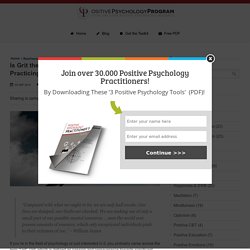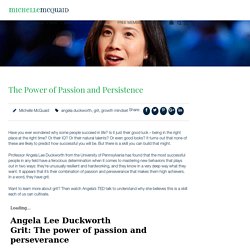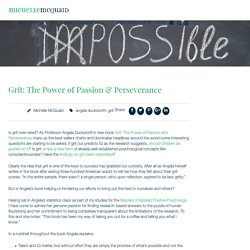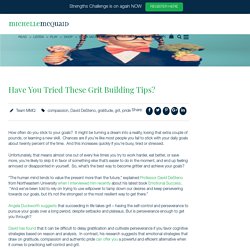

" Marie Curie
"The pulling force of purpose is one of the key predictors of grit. Grit is stamina, but it’s not just stamina in your effort. It’s also stamina in your direction." Angela Duckworth
"The most useful form of patience is persistence. Patience implies waiting for things to improve on their own. Persistence implies keeping your head down and continuing to work when things take longer than you expect." James Clear
"Giving your best effort does not mean simply working harder at what you were already doing. It can mean that, but it often means searching harder for a better way to do things.,Giving your best effort involves execution and strategy.
Is Grit the New It? Developing Your Passion and Practicing Perseverance -
Home » Resilience » Is Grit the New It?

Developing Your Passion and Practicing Perseverance “Compared with what we ought to be, we are only half awake. Our fires are damped, our drafts are checked. We are making use of only a small part of our possible mental resources. . .men the world over possess amounts of resource, which only exceptional individuals push to their extremes of use.” – William James If you’re in the field of psychology or just interested in it, you probably came across the term “Grit”. Angela grew up being told that she was no genius, but years later was awarded the MacArthur Fellowship also known as the “genius grant”. Grit: The power of passion and perseverance [ TED Talk : Angela Lee Duckworth ] The Power of Passion and Persistence. Have you ever wondered why some people succeed in life?

Is it just their good luck – being in the right place at the right time? Grit: The Power of Passion & Perseverance. Is grit over-rated?

As Professor Angela Duckworth’s new book Grit: The Power of Passion and Perseverance, roars up the best-sellers charts and dominates headlines around the world some interesting questions are starting to be asked. If grit out predicts IQ as the research suggests, should children be graded on it? Is grit simply a new term of already well-established psychological concepts like conscientiousness? Have the findings on grit been overstated? Clearly the idea that grit is one of the keys to success has grabbed our curiosity. But is Angela’s book helping or hindering our efforts to bring out the best in ourselves and others? Having sat in Angela’s statistics class as part of my studies for the Masters of Applied Positive Psychology, I have come to admire her genuine passion for finding research-based answers to the puzzle of human flourishing and her commitment to being completely transparent about the limitations of the research.
Have You Tried These Grit Building Tips? How often do you stick to your goals?

It might be turning a dream into a reality, losing that extra couple of pounds, or learning a new skill. Chances are if you’re like most people you fail to stick with your daily goals about twenty percent of the time. And this increases quickly if you’re busy, tired or stressed. Unfortunately, that means almost one out of every five times you try to work harder, eat better, or save more, you’re likely to skip it in favor of something else that’s easier to do in the moment, and end up feeling annoyed or disappointed in yourself.
So, what’s the best way to become grittier and achieve your goals? “The human mind tends to value the present more than the future,” explained Professor David DeSteno from Northeastern University when I interviewed him recently about his latest book Emotional Success. Why Grit Isn’t Everything. Is grit the key ingredient for your success?

Researchers define grit as the passion and perseverance to achieve your long-term goals. So it makes sense that over the last few years it has been championed as the silver bullet that enables our success. Choose Courage. When confronted with news of a stranger’s unimaginable pain – a suicide, an overdose, a protest for justice and basic dignity – we have two choices: We can choose to respond from fear or we can choose courage.

We can choose to believe that we are somehow insulated from the realities of these traumas and that our willpower or our strength of character makes us better than these displays of desperation and woundedness. When we seek shelter in the better than – safer than – different than thinking, we are actually choosing fear and that requires us to self-protect and arm ourselves with judgment and self-righteousness. Our only other option is to choose courage. Rather than deny our vulnerability, we lean into both the beauty and agony of our shared humanity. Choosing courage does not mean that we’re unafraid, it means that we are brave enough to love despite the fear and uncertainty. Our choices have consequences: They make the world a more dangerous place or they cultivate peace.
10 Features of Courageous Choice. Extreme swimming with the world's most dangerous jellyfish [ TED Talk : Diana Nyad ] Never, ever give up [ TED Talk : Diana Nyad ] To raise brave girls, encourage adventure [ TED Talk : Caroline Paul ] Commitment. Taking Action. Know-How. Self-Improvement. Stretching Yourself. Patience. Self-Discipline. Escalation of Commitment. 5 Ways to Develop a Growth Mindset Using Grit and Resilience.
Podcasts. Purpose. Locus of Control. Endurance. Growth Mindset.